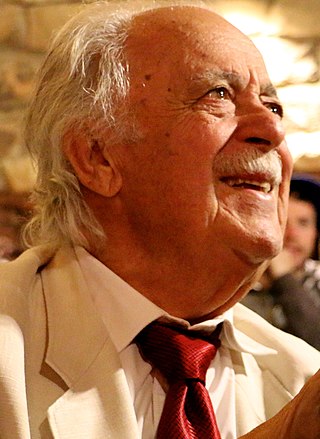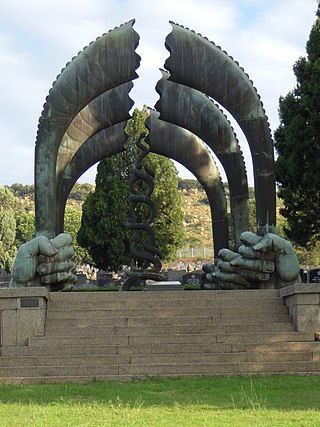
George Bizos was a Greek-South African human rights lawyer who campaigned against apartheid in South Africa. He was noted for representing Nelson Mandela during the Rivonia Trial. He instructed Mandela to add the qualification "if needs be" to his trial address, which is credited with sparing him from a sentence of death. Bizos also represented the families of anti-apartheid activists killed by the government, throughout the hearings of the Truth and Reconciliation Commission.

Ahmed Mohamed Kathrada OMSG, sometimes known by the nickname "Kathy", was a South African politician and anti-apartheid activist.

Allan Aubrey Boesak is a South African Dutch Reformed Church cleric, politician and anti-apartheid activist. He was sentenced to prison for fraud in 1999 but was subsequently granted an official pardon and reinstated as a cleric in late 2004.

The International Day for the Elimination of Racial Discrimination is observed annually on 21 March since declared by the United Nations in 1966. In South Africa, the country in which the event took place that gave rise to the observance, the Sharpeville Massacre, the day is commemorated as Human Rights Day, and is a public holiday.
The 2001 World Conference against Racism (WCAR), also known as Durban I, was held at the Durban International Convention Centre in Durban, South Africa, under UN auspices, from 31 August to 8 September 2001.

The South African Human Rights Commission (SAHRC) was inaugurated in October 1995 as an independent chapter nine institution. It draws its mandate from the South African Constitution by way of the Human Rights Commission Act of 1994.

Pravin Jamnadas Gordhan is a politician and anti-apartheid activist who has held various ministerial posts in the Cabinet of South Africa. He served as Minister of Finance from 2009 until 2014 and again from 2015 until 2017, as Minister of Cooperative Governance and Traditional Affairs from 2014 until 2015, and as Minister of Public Enterprises since February 2018.
The Johannesburg Central Police Station is a South African Police Service police station in downtown Johannesburg, South Africa. From its unveiling in 1968 until September 1997, it was called John Vorster Square, after Prime Minister B.J. Vorster.
Racism in South Africa can be traced back to the earliest historical accounts of interactions between African, Asian, and European peoples along the coast of Southern Africa. It has existed throughout several centuries of the history of South Africa, dating back to the Dutch colonization of Southern Africa, which started in 1652. Before universal suffrage was achieved in 1994, White South Africans, especially Afrikaners during the period of Apartheid, enjoyed various legally or socially sanctioned privileges and rights that were denied to the indigenous African peoples. Examples of systematic racism over the course of South Africa's history include forced removals, racial inequality and segregation, uneven resource distribution, and disenfranchisement. Racial controversies and politics remain major phenomena in the country.

Westpark Cemetery is a large cemetery in Johannesburg, South Africa, and is the resting place of some of the country's well-known citizens. It is a non-denomination designated burial ground, and thus has Christian, Jewish, Muslim and Chinese burial areas. The Jewish section contains a Holocaust Memorial, erected in 1959.

The Economic Freedom Fighters (EFF) is a South African communist and black nationalist political party. It was founded by expelled former African National Congress Youth League (ANCYL) president Julius Malema, and his allies, in 2013. Malema is president of the EFF, heading the Central Command Team, which serves as the central structure of the party. It is currently the fourth-largest party in the National Assembly.

Ismail Ahmed Cachalia (1908-2003), popularly known as Moulvi, was a South African political activist and a leader of Transvaal Indian Congress and the African National Congress. He was one of the leaders of the Indian Passive Resistance Campaign of 1946 and the Defiance Campaign in 1952. The Government of India awarded the fourth highest Indian civilian honour of Padma Shri in 1977.

Sonia Bunting, OLS was a South African journalist, and a political and anti-apartheid activist. After being charged with treason and imprisoned, being detained a second time, and barred from publishing, she and her husband went into exile in London, where she joined the Anti-Apartheid Movement (AAM) and organised the World Campaign for the Release of South African Political Prisoners. When the African National Congress (ANC) ban was lifted in 1991, she returned to South Africa where she was involved in political activism until her death in 2001. She was posthumously honored by the government of South Africa with the Order of Luthuli in Silver in 2010.

South Africa–Sweden relations refers to the bilateral relations between Sweden and South Africa. Formal relations between the two countries began with the opening of a South African legation in the 1930s with relations being upgraded to ambassadorial level in 1994 following South Africa's first non-racial democratic elections. In 2000 a South African - Swedish Binational Commission was established by President Thabo Mbeki and Prime Minister Göran Persson.
"Dubul' ibhunu", translated as shoot the Boer, as kill the Boer or as kill the farmer, is a controversial anti-apartheid South African song. It is sung in Xhosa or Zulu. The song originates in the struggle against apartheid when it was first sung to protest the Afrikaner-dominated apartheid government of South Africa.

Leon Amos Schreiber is a South African writer and politician who is currently serving as Minister of Home Affairs since 3 July 2024. A member of the Democratic Alliance (DA), he has been a Member of the National Assembly of South Africa since May 2019.

Devikarani Priscilla Sewpal Jana was a South African human rights lawyer, politician and diplomat. As a member of the African National Congress (ANC) during the anti-apartheid movement, she participated in both legal activism as well as in the underground movement to end apartheid. She represented many significant figures in the movement, including South African president Nelson Mandela, Winnie Madikizela-Mandela, Steve Biko, Govan Mbeki, Walter Sisulu, and Archbishop Desmond Tutu. Jana was one of the very few South Africans who had access to political prisoners, including Mandela, in the maximum security Robben Island prison, and served as an emissary for coded messages between the political prisoners and the ANC leadership.
Max Coleman was a South African activist and former businessman. He represented the African National Congress (ANC) in the National Assembly from 1994 to 1995 and then served in the South African Human Rights Commission from 1995 to 1996. During apartheid, Coleman was a founding member of the Detainees' Parents' Support Committee, a civil society organisation, after his son was detained for his political activities. Coleman subsequently sold his business in order to organise on the committee's behalf full time.
Amina PahadOLS was a South African anti-apartheid activist. A member of the Transvaal Indian Congress, she rose to prominence for her role in passive resistance against the Asiatic Land Tenure and Indian Representation Act of 1946. She was also known as the matriarch of the Pahad family's politically active home in Johannesburg.
Nicolaas Johannes Deetlefs is a former South African policeman and alleged torturer under Apartheid. He interrogated anti-Apartheid activists who were detained at Johannesburg's John Foster Square under the infamous Terrorism Act from 1979 until the end of Apartheid in 1994. Allegations of assaulting and assassinating some of his detainees who mysteriously died while in holding cells were levelled against Deetlefs.













